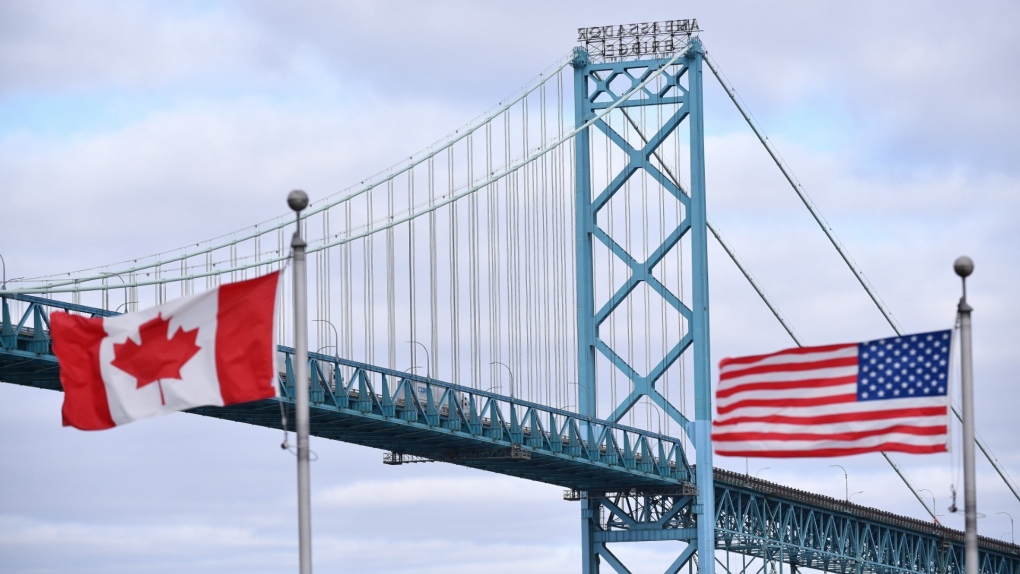A majority of Canadians would be hesitant to buy U.S. goods in response to the proposed American tariff on products from Canada, according to a new survey.
The findings of a recently released Nanos Research survey suggest a tariff on Canadian exports into the U.S. would, for two-thirds of Canadians, negatively impact the likelihood they’d purchase U.S.-made goods.
On Nov. 25, U.S. president-elect Donald Trump said he would impose a 25 per cent tariff on imports from Canada and Mexico until the two countries clamped down on drugs, particularly fentanyl, and migrants crossing the border.
yes, but what goods are even made in the us these days?
I always get a good laugh when I see a giant “PROUDLY MADE IN USA” sticker that has a big US flag.
and it’s on a plastic tub. Or a bucket. I think the plastic brush I use to clean my cast-iron pan is from the US, but again it’s just a lump of plastic.
I guess I shouldn’t be surprised that the most common USA-produced good I interact with is oil.
It’s not manufactured goods, but Canada imports a lot of produce from the US.
During the last Trump administration, I avoided buying American-grown fruit and vegetables whenever I could.
Same, started doing it again yesterday.
Except this time, for all its evils, I have AI to suggest meals/recipes based on what Canadian produce looks good and is at a reasonable price in the store.
similar…
The one thing i cant replace, though, are my cosmic crisp apples. Just the best.
where was that AI made?
Probably America. Why?
Well i’m jus saying that if we are going to get away from american made products, why not the code?
What’s a Canadian alternative? (I mean, you could try Mistral I suppose…?)
It’s also the free version and as it doesn’t have advertising, if anything it costs them a bit to run.
well, i mean, i refuse to use AI, but sure.
Canada Imports from United States was US$277.04 Billion during 2023 https://tradingeconomics.com/canada/imports/united-states
I used to live in Washington state, and canadians would come across the border and buy up all the pop tarts bcz they didn’t have the ones we had (not sure if they didn’t have them at all, or the ones we had were better)
But point t is, the shelf would be bare after the weekend from people flocking to buy them out.
Just about anything to do with food is because Canadian versions (much like European versions) don’t have as many nasty ingredients. Just look up Canadian vs American Froot Loops as the most visually striking example (food dyes that are ok in USA but illegal in Canada & EU). I’ve heard Oreos taste completely different in The States too.
Just thought of another example… Americans driving south to get Mexican Coke because they were still using sugar cane instead of high fructose corn syrup.
They still do use that sugar cane, some folk swear it’s the best Coke you can drink
Puts on tinfoil hat… Ok, so I heard, the Mexicans couldn’t keep up with demand for cane sugar Coke in border towns so they had to start using HFCS to be able to pump out enough product. Because of more relaxed labeling laws they didn’t have to tell anyone.
On a more serious note, have you ever tried Jones Soda? They use cane sugar and they make the best cream soda you’re ever gonna taste. Probably harder to find now that every corner store has wiped out all beverage inventory in favour of beer. Seriously, it’s just beer and energy drinks now.
That’s why I only drink water precipitated upon leaves in the morning sun
I call it Mountain Dew
You do the Dew, do you? Higher caffeine American condensed water vapour or the weaker Canadian stuff?
Only what I can collect in the morning before the sun dries it up and grizzlies come out to eat my ass
Jones Soda is great.
Are you typing this from a computer or phone? Those are often “made in USA” even if the product comes directly to Canada from China.
Plenty
Because the USD:CAD conversion rate isn’t bad enough, let’s add huge tariff BS to the mix. Dollar values are one thing, but outright anti-consumer tactics? You don’t want our business, fine F U, we’re almost certainly better off without.
I might as well cancel my Amazon prime membership
Please do that anyway.
5 per cent would be somewhat more likely to buy U.S. products
7 per cent would be more likely to buy U.S products
🤔
Weirdly, there are MAGAts in Canada.
NAFTA/USMCA working hard to complete its mission. :/
Well… Would we bring back jobs such as producing copper pipes…
We mine it and send it to China and pay incredibly high prices for a product that we produce in vast quantities…
The same goes for clothing and food let’s face it…
We produce enough dairy for our needs, the smae for wheat and wood…
So… We could be auto sufficient… But prices would rise… But jobs would also be in higher quantities
I used to work at a Saskatoon clothing manufacturer in the 70s, back when we hadn’t sold our souls to unfettered capitalism.
Why we aren’t funding farmers to grow flax (for linen) and hemp - along with funding for local manufacturers to make the fabric - is beyond me.
We actually do grow flax in Canada…and then don’t make linen out of it -_-
EDIT: Ah, apparently you can get either fibres or oil from any particular flax crop, but not both, because you harvest at different times
Yup. And oil seed (canola, corn, flax, etc) is top of the heap now.
Can’t say I blame y’all. 🫤
Agree that it would appear to be a reasonable and measured response.
It’s like how I don’t buy Israeli, Texan or Florida products anymore. Good for them.
Doubtful. They might tell a pollster that but there’s a big gap between that and making actual changes and even sacrifices in terms of purchasing decisions.
I sure as heck would not blame them. I mean it would not be that hard to ship goods between canada and mexico.
A fair amount of raw materials pass over the borders in the production of so many things that even if they are Canadian made parts and materials may have tariffs on them.









